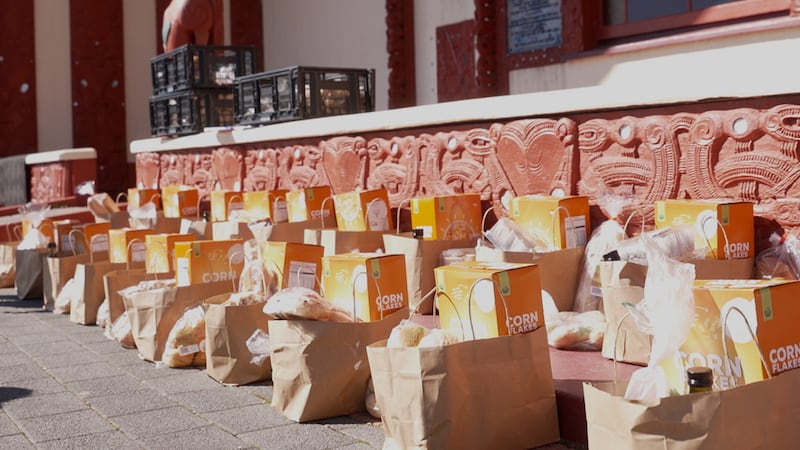For over 200 years the Whakarewarewa Living Village has been a spectacular world tourism attraction showing off Māori manākitanga (caring) at its very best to the millions of visitors that have crossed its bridge into the small settlement of Tūhourangi Ngāti Wāhiao.
But now, with the return of Covid-19, the village is closed to all outsiders as residents keep safe in their bubble of close to 75 people.
A small dedicated few from the village are showing this same manākitanga for their very own elderly and whānau living in The Whakarewarewa Living Village.
This morning at 8:30 am from The Rotorua Whakaora Hub operated by Elmer and Gina Pfeifer, Reni Clarke and her small group of Whakarewarewa volunteers began packing up to 80 bags of kai for whānau in the village and abroad, for all who were in need of kai. The food has included meat, soups, bread and milk, eggs, sauces, and oil, biscuits, chips, fruits, vegetables and the kaumātua favourite - pink iced buns.
One happy recipient of the food packages was 80-year-old Whakarewarewa guide and village kuia Chrissie Gardiner. She was just 12 years old when she first helped welcome Queen Elizabeth to her village over 67 years ago.
Food, help and conversations
She says seeing the next generation of youth sharing kai out to her people makes her feel proud to be Māori. “You can see that they look after their own, with food, help, and conversations - that’s what makes us Māori,” Gardiner said.
Tourism has been Tūhourangi Ngāti Wāhiao’s main source of income for over 200 years. From ticket sales for tours to selling Māori art pieces, the whānau of the village have shown Māori culture to tourists for income.
But the Covid lockdown has stopped all overseas tourists and made times tough for all tourist ventures around the country and throughout the world.

Another resident who walked only a few meters from her doorstep to Te Pākira Marae, nestled in the Whakarewarewa Living Village to pick her kai pack up was Tyra Morrison. Asked about her thoughts on the lack of international or regional tourism, she talked about the whānau who own the businesses.
“It’s a shame how they have got nothing, no income, no shop now, they can’t show their beauty to the rest of the world.”
For now, these 25 families residing at Whakarewarewa are doing well with the support from Clarke and whānau. Clarke says they will continue to make these kai deliveries to their people, Covid or no Covid, and kuia Chrissie Gardiner was elated to hear that good news as she walked home with her bag of pink iced buns.


